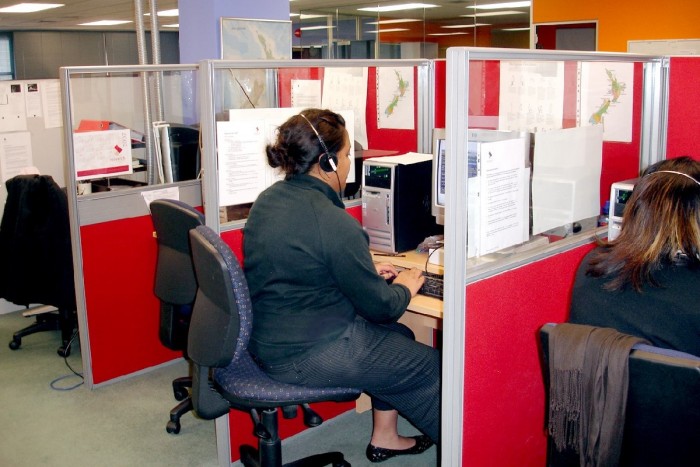Survey Interviewer
Kaiuiui Rangahautanga
Alternative titles for this job
Survey interviewers collect facts and opinions by interviewing people. They conduct interviews for market research companies, government agencies and other organisations.
Pay
Experienced survey interviewers usually earn
$24-$40 per hour
Source: careers.govt.nz research, 2018.
Job opportunities
Pay
Pay for survey interviewers varies depending on experience.
- Survey interviewers can earn between $24 and $40 an hour.
Some companies offer performance incentives and long-service incentives.
Some experienced survey interviewers are self-employed and contract their services to market research companies for an hourly rate.
Source: careers.govt.nz research, 2018.
- PAYE.net.nz website - use this calculator to convert pay and salary information
- Employment New Zealand website - information on minimum wage rates
(This information is a guide only. Find out more about the sources of our pay information)
What you will do
Survey interviewers may do some or all of the following:
- phone people to make appointments for interviews
- interview people at their home or business in person or by phone
- approach and interview people in the street or other public places such as railway stations or shopping centres
- ask set questions in a survey questionnaire
- record the answers on a survey form, computer or tablet
- keep a record of the interview for the survey supervisor.
Skills and knowledge
Survey interviewers need to have:
- knowledge of their interview topic and different interview methods
- research and writing skills, including the ability to spell correctly
- good keyboard and computer skills.
Working conditions
Survey interviewers:
- may work full time, part time or on a casual basis
- work in offices and call centres, or conduct surveys in people's homes or on the street
- sometimes travel locally or nationally to conduct surveys.
What's the job really like?

Michelle Finau
Survey Interviewer
Different projects make survey interviews interesting
Michelle Finau works as a supervisor for a market research company in Auckland that does phone and field interviews for a range of clients.
"I find that the interview subjects are very interesting – and we get to know the results before anyone else," Michelle says.
Passing on her skills
Michelle trains survey interviewers and makes sure her team meets quotas, asks the right questions, and records accurate survey answers.
Watching people she's trained grow more confident is a source of achievement. "When they first started they were shy. Now, hearing them on the phone, it's like they don't need me," she says.
Staying happy helps interviews
If difficult interviews happen, she tells interviewers to stay happy, calm and confident.
"You just need to be confident over the phone and ensure the person on the phone feels comfortable," she says. "If you smile on the phone, there’s a good vibe at the other end of the phone."
Entry requirements
There are no specific requirements to become a survey interviewer. However, a good standard of spoken and written English, computer skills, and a driver's licence are useful.
Survey interviewers usually get training when they start their job.
Secondary education
There are no specific secondary education requirements for this job. However, NCEA Level 1 English, maths and social studies are useful.
Personal requirements
Survey interviewers need to be:
- good at listening and talking to people from a range of backgrounds
- tactful, patient, polite and friendly
- able to follow instructions
- accurate and honest when recording information
- able to keep information private
- good at planning and organising.
You just need to be confident over the phone and ensure the person on the phone feels comfortable. If you smile, there’s a good vibe at the other end of the phone.

Michelle Finau
Survey Interviewer
Useful experience
Useful experience for survey interviewers includes:
- interviewing
- sales
- customer service
- hospitality work.
Physical requirements
Survey interviewers need to be able to spend a long time sitting or standing, and have good hearing and clear speech.
Survey interviewers who interview people in person need to be reasonably fit as they may need to walk long distances, or up and down stairs.
What are the chances of getting a job?
Turnover high for survey interviewers
Turnover among survey interviewers is high because:
- jobs are often short-term, casual or part time
- workers move on to other higher paying jobs.
Demand for interviewers is gradually falling because:
- online surveys are becoming increasingly popular, reducing the need for interviewer-assisted surveys
- some companies are using cheaper overseas call centres to cut costs.
According to the Census, 1,041 survey interviewers worked in New Zealand in 2018.
Types of employers varied
Survey interviewers may work for:
- research firms
- large private companies
- government departments.
Some experienced survey interviewers are self-employed and work on contract.
Sources
- Davison, B, human resources manager, Nielsen, careers.govt.nz interview, March 2018.
- Ministry of Business, Innovation and Employment, '2006-2014 Occupation Data' (prepared for Careers Directorate – Tertiary Education Commission), 2015.
- Stats NZ, '2018 Census Data', 2019.
(This information is a guide only. Find out more about the sources of our job opportunities information)
Progression and specialisations
Survey interviewers may progress to jobs in areas such as:
- supervising
- fieldwork project management
- market research analysis
- telemarketing.
Last updated 28 March 2025

